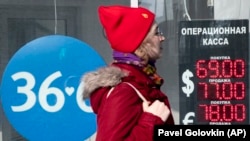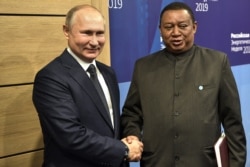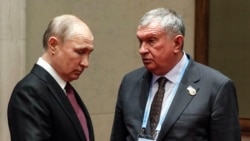On March 6, negotiations over a pact between major oil producers to limit supplies fell apart after Russia rejected a proposal by the Organization of the Petroleum Exporting Countries (OPEC), including Saudi Arabia, to respond to lower demand caused by the coronavirus outbreak.
Afterward, both Saudi Arabia and Russia said they will boost oil production. OPEC removed its own limit, triggering a nearly 25 percent drop in crude oil prices on a single day – Monday, March 9 -- and a panic on global stock markets.
The previous day, March 8, the Russian ruble fell by more than 9 percent, settling at 74.8 per U.S. dollar on March 9.
Despite those reactions, Dmitry Kiselyov, CEO of the state-owned media conglomerate Rossiya Segodnya, which includes Sputnik and RIA Novosti among others, and known as the Kremlin’s propaganda mastermind, joined a chorus of Russian officials making optimistic claims.
“Don’t panic,” he wrote on Telegram that day. “Oil is falling but Russia remains in the black, not allowing its opportunities in the global oil market to be curtailed. Strategically, the decision is the right one. Had we agreed to a bad deal with OPEC (read - with the Saudis) - we would have been thrown overboard and deprived of new income. Now we have a chance not only to extract and sell as much as we need to extract and sell, but also to send American LNG overboard.”
This is misleading.
In addition to the immediate hit to the ruble, experts say the move will add to Russia’s chronic economic woes and hit ordinary citizens in the pocketbook.
Atlantic Council senior fellow Anders Aslund told Polygraph.info: “The lower oil price will inevitably reduce Russia’s GDP (gross domestic product) , investments and standard of living, because the country will receive less imports from abroad for its exports of oil and gas, which have accounted for two-thirds of Russia’s exports when the prices have been high.
“What matters to the Russian people is economic growth and their standard of living,” Aslund said.
Leonid Fedun, the CEO of privately owned Lukoil, Russia’s second-largest oil company, called Russia’s exit from the pact with OPEC “irrational.” With oil prices falling to around $40 per barrel and Russia exporting about 5 million barrels a day, “Russia will be losing $100 to $150 million daily,” Fedun said.
On average, Russia has been producing about 11.5 million barrels of oil a day. The independent Russian business newspaper Vedomosti, citing Energy Minister Andrey Novak, reported that the country’s oil production could increase by 500,000 barrels per day in 2020.
Production increases by Saudi Arabia and Russia could lead to “real price wars” beginning in April, with prices falling below $30 a barrel, analysts told Vedomosti. In such a scenario, the Russian oil industry could only survive with substantial financial infusions from the federal budget and a significant devaluation of the ruble.
The price for Brent crude oil, an industry standard, stood at more than $50 a barrel on Friday, March 6, before the OPEC talks broke down. As of midday on Wednesday, March 11, the price for Brent crude oil was $36 a barrel.
Russian economists predicted falling oil prices could ignite inflation that will affect domestic prices from food to clothes and cars.
Experts said the U.S. oil industry can be the biggest casualty of the Russian-Saudi standoff. Half of the U.S. shale oil producers could go bankrupt because they “have little ability to withstand lower prices,” The Wall Street Journal quoted analysts as saying.
The U.S. responded to the crisis on Tuesday by suspending sales from its Strategic Petroleum Reserve (SPR).
Analysts at the Atlantic Council agreed in part with Kiselyov’s assertion that U.S. oil and gas industries could also suffer, but not as much as Russia’s.
“The dislocations from this price war will be severe, but once again Saudi Arabia and Russia may be miscalculating if they think the pain will be worse for us than them,” said David Goldwyn, chairman of the Atlantic Council’s Energy Advisory Group.
“The impact on the Russian economy is likely to be serious and lasting,” said the council’s Aslund. He compared the situation to 2008, when the price of oil fell to $32 per barrel, Russia’s stock market fell by 80 percent in dollar terms over a half a year, and the country’s GDP slumped by 8 percent.
“The Russian stock market never recovered from that blow,” Aslund said. “The question remains how much suffering Russia’s poor people are prepared to take.”
According to Russia’s natural resources and environment ministry, oil and gas production accounted for 60 percent of Russia’s GDP in 2019.
Russian officials sought to shift blame on Saudi Arabia, the world’s second-biggest oil producer after the United States.
Mikhail Leontiev, press secretary of Rosneft, Russia’s state-owned oil and gas giant, said the decision to boost oil production freed Russia from damaging limitations. Continuing to adhere to the pact with OPEC was “masochistic” for Russia since it was designed to clear cheap Russian oil from the market so that U.S. liquefied natural gas (LNG) could take its place and become a global monopoly, Leontiev said.









